A Thesis Statement is a declaration stating the author’s principal position or claim brought forth by the thesis in a debatable analytical manner that provokes the reader’s curiosity and interest.
In this article, we have provided you with the best how-to-write guide along with professionally crafted examples. But first, let us get you familiar with what a thesis statement exactly is and why is it written.
It will typically be a sentence long and is written after the introduction to summarize what the reader should expect in the essay. The following explanation can distinguish a thesis and a thesis statement; a thesis highlights the author’s interpretation of a question or topic and not the topic in general, while a statement answers the question at hand.
Thesis Statement Template

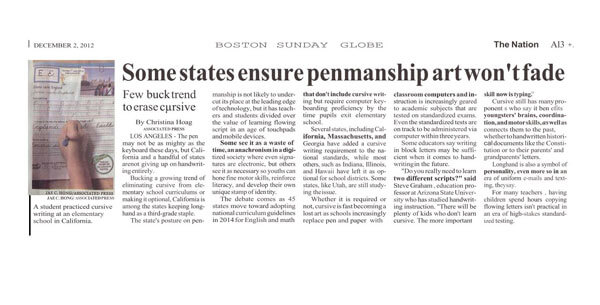

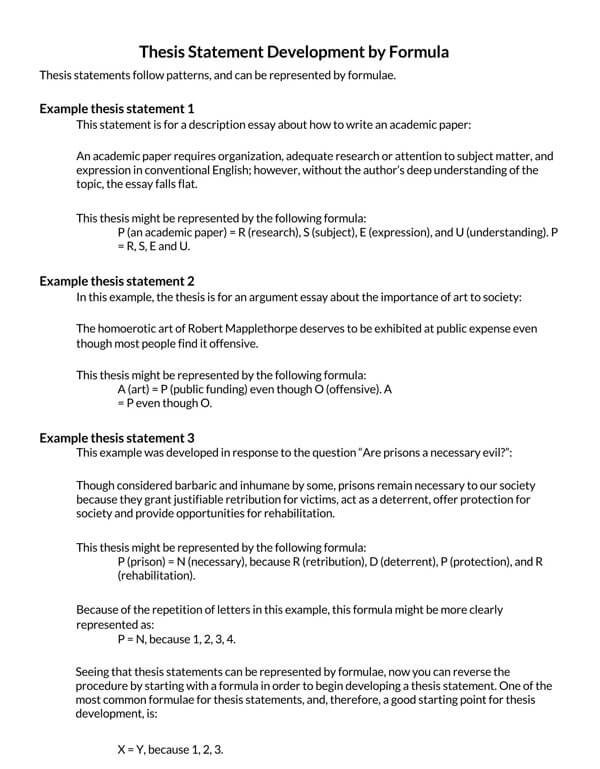
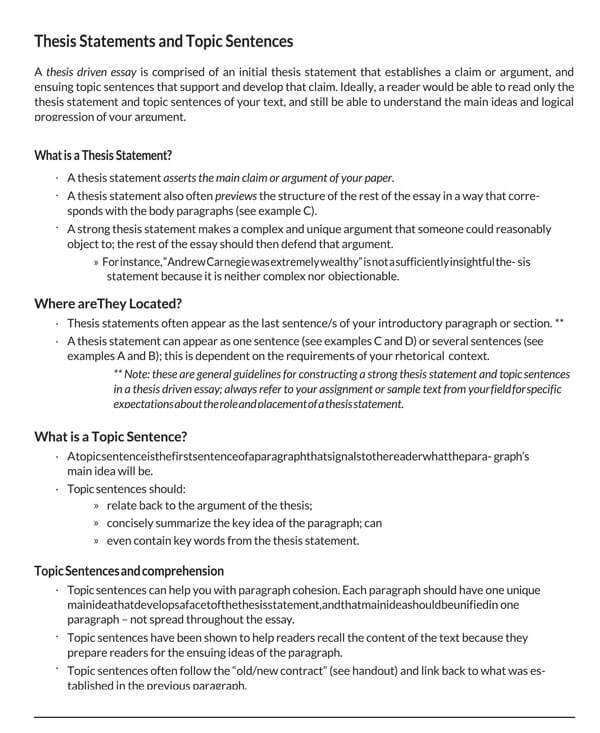
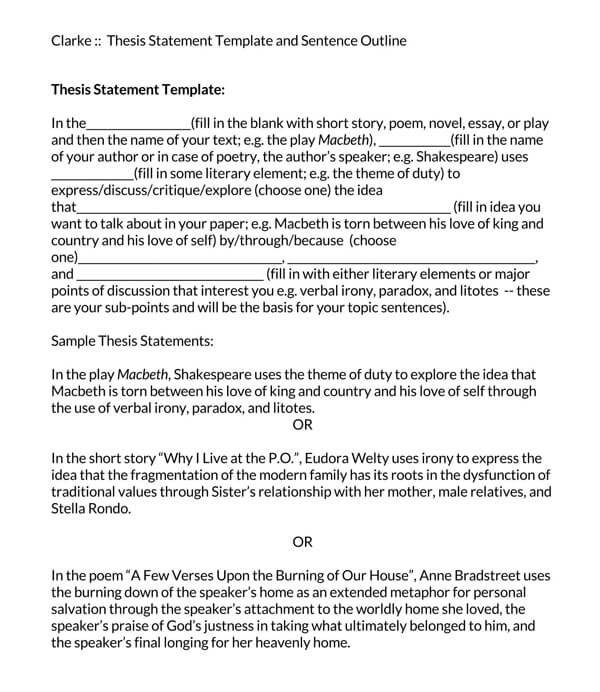

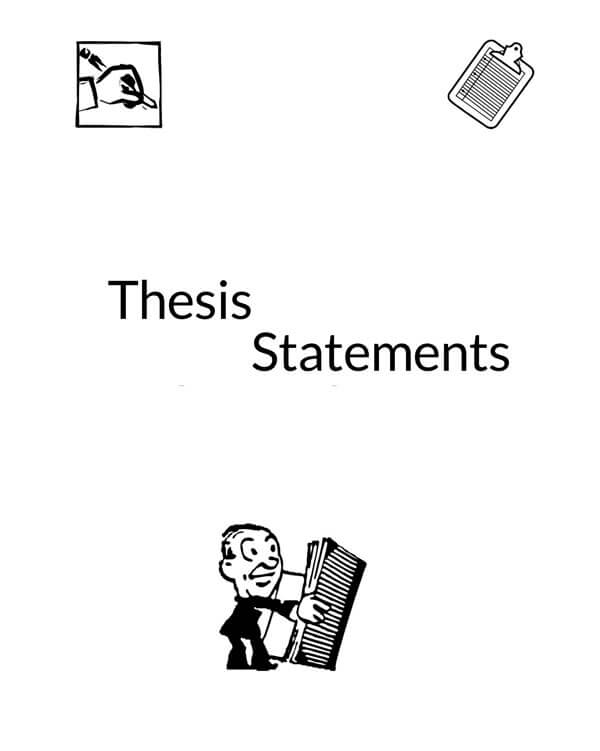
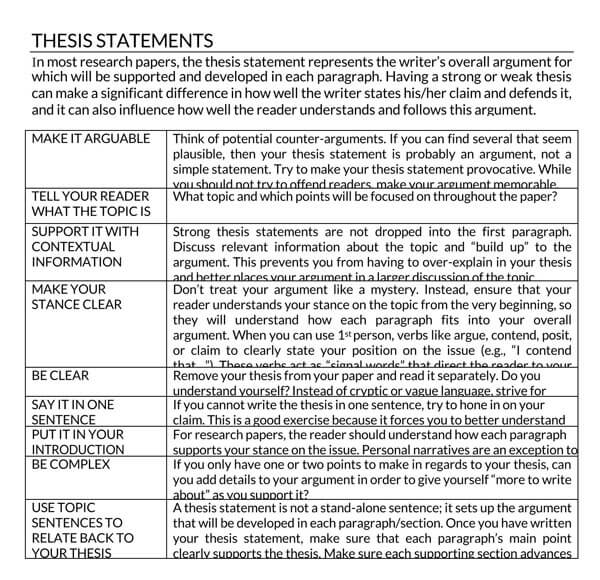
Types of Thesis Statement
There are four types of statements authors can provide depending on the type of thesis at hand. These are analytical, argumentative, expository, and personal statements.
They differ, as discussed below:
Argumentative thesis
Argumentative essays are meant to persuade the reader to agree with the author’s point of view or “argument.” This type of thesis focuses on a consistent perspective and uses logic and evidence to argue out the perspective. Therefore, its thesis statement should cover the central perspective (author’s stand); state the reasoning behind the argument and critical points that will be further highlighted in the essay to persuade the reader.
EXAMPLE
Without the proper legislation in place, the success of the war on corruption is still achievable depending on the political will and the core values of a society.







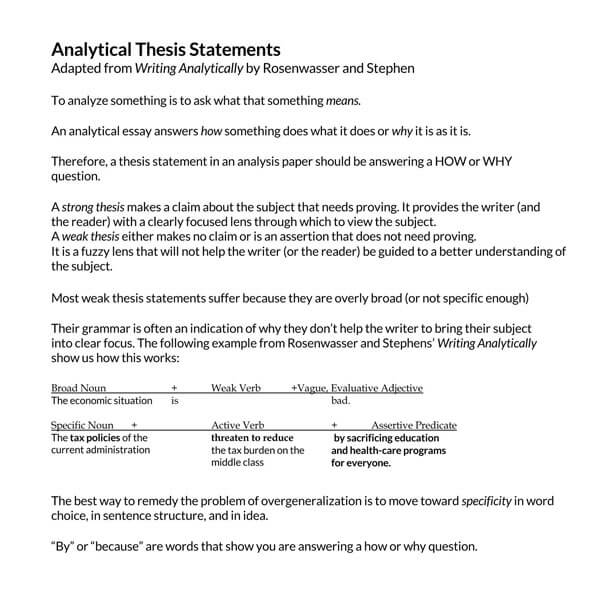


Expository thesis
An expository thesis outlines factual information on a particular subject/topic or process. It highlights existing evidence of the information available without necessarily bringing forth a strong opinion or claim.
Therefore, an expository statement lets the reader know the essay’s purpose, the topic at hand, and key points to be discussed in detail in the essay. A general approach that can be used to assist with writing a statement is using the starting phrase as in this example; “In this essay/thesis, I will teach my readers……
EXAMPLE
The key components of a healthy lifestyle for athletes are regular exercise, a nutritious diet, discipline, and adequate sleep.










Analytical thesis
Analytical theses are used to analyze a text and communicate a specific interpretation of the text. In addition, the analysis should lead to a more consolidated conclusion. Therefore, an analytical thesis statement should outline the conclusion, aspect of a topic, or key points used to arrive at a conclusion and indicate the paper or text being analyzed as discussed in the example phrase below.
“In this thesis, I argue……….by analyzing (factor one, factor two, factor three….) .and (last factor)” can be used as a head start.
EXAMPLE
In Jane Eyre, the usage of supernatural elements, mythic references, and fairy motifs promote a sense of anxiety throughout the book, making a traditionally happy ending implausible.
Personal thesis
Personal essays are more prevalent in creative writing. Personal essays draw from the author’s experience to communicate a particular message, such as a lesson or principle. In addition, the essay will often have a moment of realization or revelation that illustrates growth, morals, change, personal trait, or irony.
EXAMPLE
A hobby can be turned into a well-paying job, and my career is a real-life representation of how the youth achieve the same.
Formats of Thesis Statement










How to Write a Thesis Statement?
How well the statement thus impacts how effectively it serves its purpose. This article will look into the different steps you can use to create an exemplary thesis statement for your work.
Step 1: Finding the perfect thesis
The first step is to identify the essay that will support the statement. The thesis should contain information, evidence, or experiences that illustrate why you came up with the conclusion, perception, or idea stated in the statement. To come up with an essay that fully develops the statement into a wholesome argument, narrative, or text, use the steps given below:
Pick a topic of interest
Select a topic you are interested in, as this facilitates writing a content-rich paper that is exciting to the reader. In some cases, the topic will be predetermined for you, and as a writer, you have to adjust accordingly and gain interest in the particular topic.
Explore your topic
Research your chosen topic and narrow it down to a specific area or aspect you can focus on in the thesis. Broad subjects compromise the quality of the thesis hence the need to focus on a particular issue as this gives a more specific direction to the thesis.
Know the target audience
Other aspects to consider about a thesis are the type, objective, and target audience of the essay. As earlier discussed, the thesis can be argumentative, analytical, personal, or expository. The type will often influence the purpose and the general tone of the paper.
EXAMPLE
In an argumentative thesis, its purpose will generally persuade the audience that how the author’s claim(s) is justified. In addition, the audience influences the tone and other techniques of writing, such as jargon.
Follow a rigid structure
When writing the thesis, ensure to follow a rigid structure so that you know what information needs to be presented and at what point to come up with a wholesome thesis. A rigid structure will ordinarily have an abstract, introduction, review, methodology, results, discussion, and conclusion.
You can create an outline or draft that captures these components and notes what information will be provided underneath each component. Fundamentally, the thesis should have a straightforward subject matter and an exhaustive summary of its contents.
Alternatively, think of the thesis as a formula or pattern for your claim, perception, or idea.
EXAMPLE
Fact, how or why (reasons) – for analytical and expository theses
Or
Fact, key steps of the process – for expository thesis statements
Or
Argument/proposal, supporting evidence – for argumentative theses
Step 2: Coming up with a thesis statement
The first step is developing a statement that addresses what will be discussed further in the paper. Then, the following steps can be followed to come up with the statement.
Start with a question
Begin by creating a question whose answer is the details provided in the essay. Then, regardless of the type, each essay can be narrowed down to a question that covers the principal perception, idea, claims, or issues to be discussed. In some cases, this question will be provided by the instructor or lecturer.
EXAMPLE 1
How did the internet revolutionize the selling of books?
EXAMPLE 2
Can climate change be reversed?
Write your initial answer
After settling on the right question, note down the first informed answer based on the information you obtained from the initial research. The answer does not necessarily have to be too detailed. The answer is meant to give you a starting point for further research. If you are to write an argumentative thesis, the answer should be leaning towards the side you will be reflecting on in the paper.
answer 1
The internet revolutionized the retail business model by improving convenience, and Amazon represents the changes in the book industry brought about by the internet.
answer 2
Climate change is an artificial issue and can be reversed through human interventions like legislation regulating carbon prints of different and more actionable measures.
Ensure your thesis is provable
The statement should be provable. It is, therefore, best to conduct exhaustive research and come up with the statement after. There should be satisfactory evidence to support the statement.
EXAMPLE
Christianity is not a natural religion as the Bible has been modified throughout its history. – Religion is more of a belief, and it cannot be proved real or not.
Instead, the statement example below would be appropriate for the topic at hand
Christianity, like any other religion, can be questioned as notable discrepancies between the old and new text of the Bible have been recorded throughout history.
Develop your answer
After writing down your answer, identify why the answer best represents your perception, idea, or claim. Then, think of ways to persuade the reader to agree with your perspective, idea, or claim. The answer should improve in substance with further research as you write your thesis. Finally, by completing the essay, the statement should capture the overall idea or claim in a summarized manner.
Step 3: Crafting a great thesis statement
As you write your thesis, always refer back to the statement so that you can refine it. Weak statements can negatively impact the interest of your audience.
Do the following things to improve your statement.
Modify your thesis
Ensure that the statement is reflective of the type of essay you have. It can be written to persuade or teach; expository statements are meant to relay information about a particular subject, whereas an argumentative statement is meant to convince the reader to agree with a particular claim, idea, or perspective.
Look at the statement examples below:
EXAMPLE 1
Boarding school is not better than day school; children in day school and boarding school have an equal chance of learning the same values. – Argumentative thesis
EXAMPLE 2
The demand for divorce lawyers in western countries has doubled in the last two decades and can be attributed to the increase of divorce cases in the same period. – Expository thesis
EXAMPLE 3
The incorporation of supernatural fiction and suspense in Stephen King’s works indicates the internal battles and fears we all face as humans. – Analytical thesis
Address a single issue
Write the statement such that it addresses a specific subject matter. Generic statements are ineffective and might cost you the reader’s interest in your work. If it is an argumentative essay, take a stance and be “for” or “against” the subject matter. The identified issue should be consistent throughout the statement as in the following example:
EXAMPLE 1
Climate change may or may not be a consequence of humans. The author’s stance is not clear in this statement.
EXAMPLE 2
Climate change can be attributed to industrialization and the progression of civilizations in the world.
Make the argument exciting
To ensure the readers are engaged throughout the essay, it is best to have a novel/new or exciting argument, idea, or perception. Selecting an argument or perception that you have not seen or heard before is a good way of coming up with an exciting thesis and thesis statement.
Step 4: Getting it right
A statement should be as effective as possible in accomplishing its purpose: to communicate to the audience what the thesis is about by highlighting the primary subject matter in one or two sentences. Employ the following techniques to improve your statement’s effectiveness.
State your thesis statement correctly
Write the thesis such that the reader explicitly understands your argument or perception. A statement is an assertion or declaration towards a particular subject matter and not a fact or observation. However, facts given in the thesis should be such that they support this declaration.
Also, it represents your stand or position regarding the subject matter to be discussed in the essay. This is the main idea to be discussed throughout the essay. This means the statement should be made to answer a specific question regarding the particular topic.
Lastly, the statement should be a debatable assertion. Readers should be able to negate or affirm your declaration.
Get the sound right
The tone is essential in engaging your target audience in writing a thesis statement. Ensure to use the suitable words and phrases that distinguish the statement from basic statements in the text. Use firm and definitive language like “because,” “since,” “for,” “is/isn’t,” “can/not,” etc.
EXAMPLE
Because Shakespeare embodied male vulnerability, Romeo expressed affection without reservations to his lover in Romeo and Juliet.
Know where to place a thesis statement
As much as the statement is a summation of what an essay talks about, it should be placed at the beginning of a paper. The most recommended position to place the statement is after the introduction to your paper. However, on rare occasions, it can appear within the introduction depending on the length of the introduction or the essay after the first paragraph.
Write concisely
One or two sentences are enough to craft an effective statement that gives the audience an idea of the thesis and the author’s position on the subject matter. There are no limitations to the word count; however, very long statements might end up diluting the intent of the statement or giving away too much information.
Analyze and re-read
Finally, review your statement and look for ways to improve it. It should have some basic characteristics as discussed in the examples above. It is an answer and should not be written as a question. Also, it is not a list. It does not have to capture every critical point of the essay; however, it can concisely outline one or two points relevant to the argument or idea.
It is subject-specific. It only introduces a topic that will be discussed in the paper. While discussing your idea, perception or argument, note that a statement does not use first-person pronouns such as “I” or “my.”
It uses an open-minded tone. It should aim to persuade, not to force the audience to agree with its argument or claim.
Edit the statement accordingly such that it fulfills its intended purpose. Always re-read the statement as you write the essay, for in some cases, the opinion or stance might have to change due to a newly developed idea on the subject matter.
Related: 7 Best Research Paper Outline Examples (Guide + Tips)
Tips for Writing Thesis Statement
To further improve the quality of your statement, there are several things you can consider. Below are some tips to incorporate into the statement. Once observed, crafting an exemplary statement that effectively accomplishes its objective becomes straightforward and achievable.
Be specific and concise
Be direct to the point and communicate what you intend in a few words. Unnecessary words result in a stuffed statement and increase the chances of repetition or deviation from the vital point. Narrow your focus and avoid highlighting generic perceptions and claims.
Contentious
Make your statement to address areas of controversy or subjects, opinions, or perceptions that people will most likely question. Coming up with an entirely new perception or interpretation of a topic is also an effective way of being contentious with the thesis.
Coherent
As much as the statement is meant to capture more than one aspect or point in your essay, its contents should be synchronized and consistent or built up to the main idea of the thesis.
Make a clear argument
From the statement, the reader should get a clear idea of the direction of the rest of the thesis. If it is argumentative, be clear on where you stand or perception on the subject matter.
Question your assumptions
To develop a unique perception or claim, you will often have to make some assumptions for your argument to hold up. The validity of these assumptions will often depend on the audience being targeted by the author.
In addition, these assumptions can be based on beliefs or values that do not align with the audiences. Therefore, identify the audience and craft a statement that uses assumptions based on the audience’s viewpoint.
Don’t hide your thesis
Your statement should always be at the beginning of the paper, where the reader will have to read it before they can delve into the actual body of the essay.
This can be after the first paragraph or after the introduction, depending on the situation; as earlier discussed, try not to overthink by using fancy language or struggling to set up the statement. It is better to have a robust and straightforward statement than a weak statement masked with fancy language.
Frequently Asked Questions
The process of developing a thesis statement can be simplified with the following steps: brainstorm the topic, research the topic and gather evidence, narrow the topic, analyze similarities and discrepancies, take a stance on the topic, make an assertion or declaration that can be supported by evidence or facts and use specific language.
This gives you a “working thesis,” which can guide the writing of the essay.
To determine if the thesis statement is strong enough, you can conduct a review and evaluation. Determine if it answers the main question you are attempting to answer within the essay, takes a specific stance, challenges others to affirm or oppose the main perception, supports the essay without losing focus of the main point.
Additionally, use the “so what?” and “how and why?” tests. The first test represents the reader’s response to “so what?” ensuring the thesis statement is relevant to the audience by connecting it to a significant issue. The second test ensures the statement lets the reader know how and why the author’s position was arrived at.
It is meant to give the reader a summary of your main point and let them know the direction you intend to take with the essay. This way, it prepares the reader on what to expect from your text.







